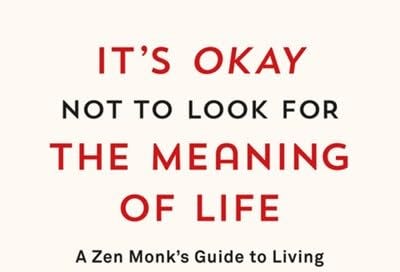I want to achieve <X>
I want to do <Y>
I want to <Z>
We all know our wants, but do we know our ‘shoulds’? That is, what we should be doing at this point in our lives?
Well, that’s one of the premises of the book: It's Okay Not to Look for the Meaning of Life by Jikisai Minami, a Zen monk.
And his argument is very simple - you need to focus on your craft and do what needs to be done, instead of just thinking abouts wants.
To put it simply, think about what you want to cherish in life, and do that. Who do you want to cherish? What do you want to cherish? Think about these two things.
Do what needs to be done for someone or for something, not for yourself. Don’t worry if the future changes. Think about what you need to do, at least now. I call this “deciding on one’s own theme, and living accordingly.
I am not saying that it is more advantageous to do what needs to be done.
That is a completely different story. Let go of your own gains and losses and emotions first. Put aside the feelings of wanting to gain or wanting things to be easy; look at what is happening to you right now and think about what “should” be done. When thinking about this, wanting to gain, and wanting things to be easy are major obstacles.
What Does It Mean to Be a Craftsman?
Being a craftsman is about more than just having a job. It's about loving what you do and always trying to do it better. Aristotle once said, "Enjoying your work leads to doing it perfectly." This idea works for all kinds of jobs, from building things to working with computers.
Why Being Good at What You Do Matters
John W. Gardner said something interesting: "A society that looks down on good plumbers but accepts bad philosophers will end up with leaky pipes and leaky thinking." This means that being really good at your job is important, no matter what that job is.
Not Needing Others to Say You're Good
One great thing about being a craftsman is that you don't always need others to tell you you're doing a good job. You know it yourself. As Marcus Aurelius said, "You have power over your mind - not outside events. Know this, and you'll be strong."
Doing What You Should, Not Just What You Want
It's important to focus on what you should do, not just what you want to do. This is like what Epictetus said: "Don't just talk about your beliefs. Live them." When you do what you should do, you're living up to your values.
The Happy Feeling of Seeing What You've Done
There's a special kind of happiness that comes from seeing what you've made or done. A scientist named Mihaly Csikszentmihalyi calls this feeling 'flow'. It's when you're so into what you're doing that you forget about everything else.
How to Think Like a Craftsman in Your Own Life
Find Your Special Skill: This doesn't have to be a traditional job. Maybe you're really good at being a parent or teaching others.
Try to Get Better All the Time: As Robert Greene says, "The future belongs to those who learn more skills and mix them in new ways."
Enjoy Learning and Improving: Remember, it's not just about the end result. Learn to love getting better at what you do.
Don't Worry Too Much About Praise: Let your work show how good you are. An old book called the Bhagavad Gita says, "You have the right to work, but don't focus on the rewards."
Pay Attention to What You're Doing: Really focus on your work. As Thich Nhat Hanh says, "When you're washing the dishes, washing the dishes should be the most important thing in your life at that moment."
By thinking like a craftsman, you not only get better at what you do, but you also become a better person. You learn to be happy with your work, to care about doing things well, and to live with purpose. This way of thinking can help you do well in your job and also live a happier, more meaningful life.




